
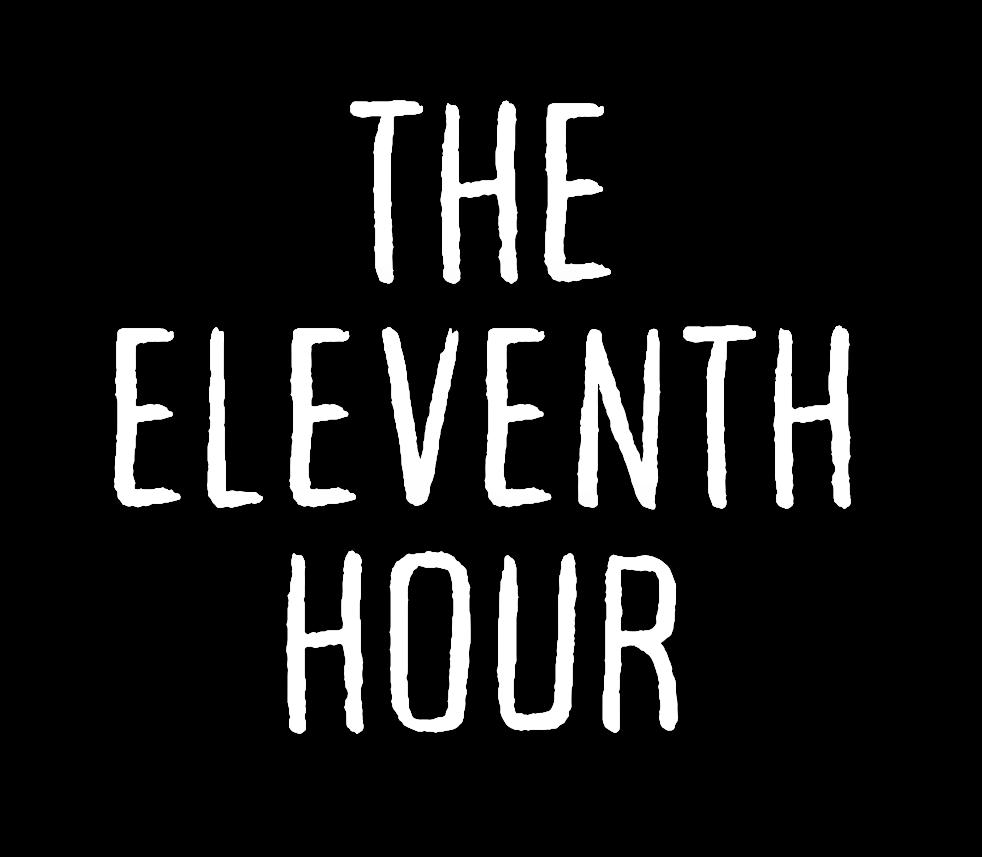

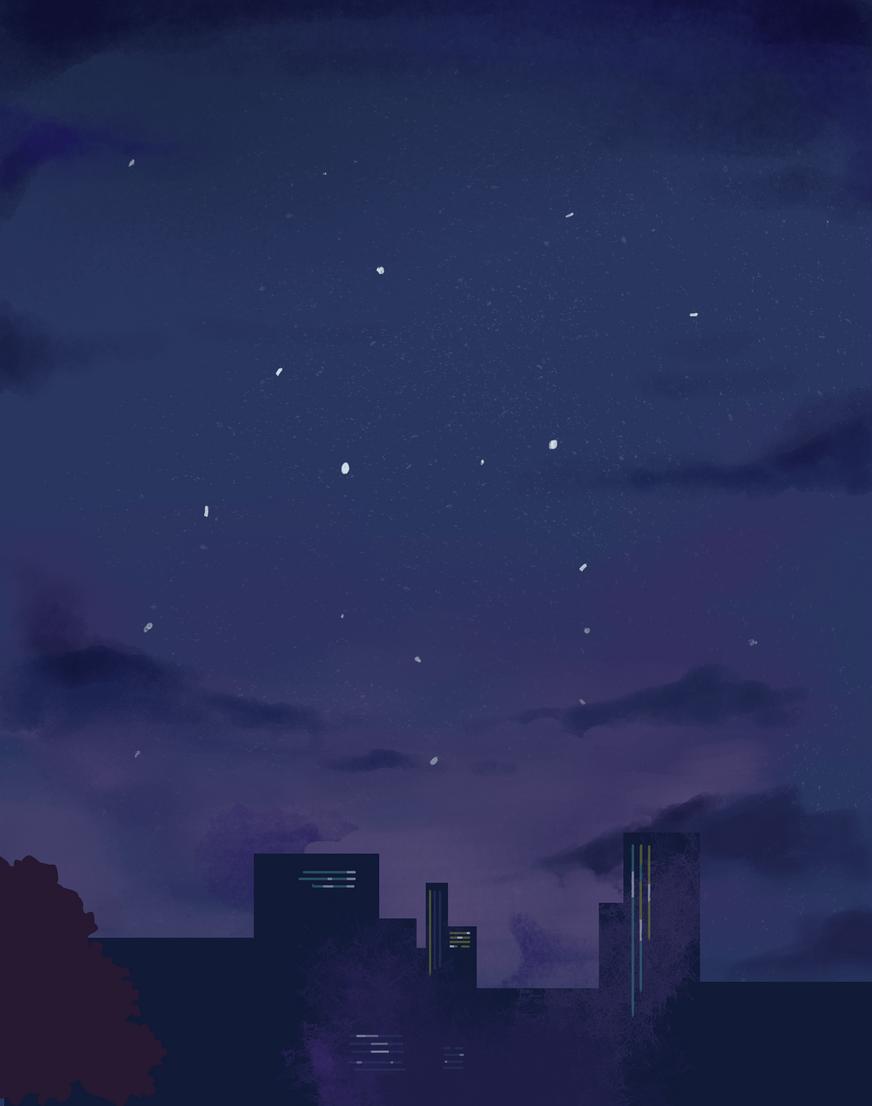

W i n t e r 2 0 2 3 | I S S U E 8 A W O M A N I S T L I T E R A R Y M A G A Z I N E

“Womanist is to feminist as purple is to lavender.”
—Alice Walker
Brown Sugar is an online womanist literary magazine for women, womxn, and womyn of color, of any nationality, sexuality, religion, or cultural diasporas that are misrepresented and underrepresented. This is a platform and space for womanists to take command of their creative expression. We aim to capture and promote the diverse cultures and living voices of women with all kinds of backgrounds and identities through poetry, prose, and art.
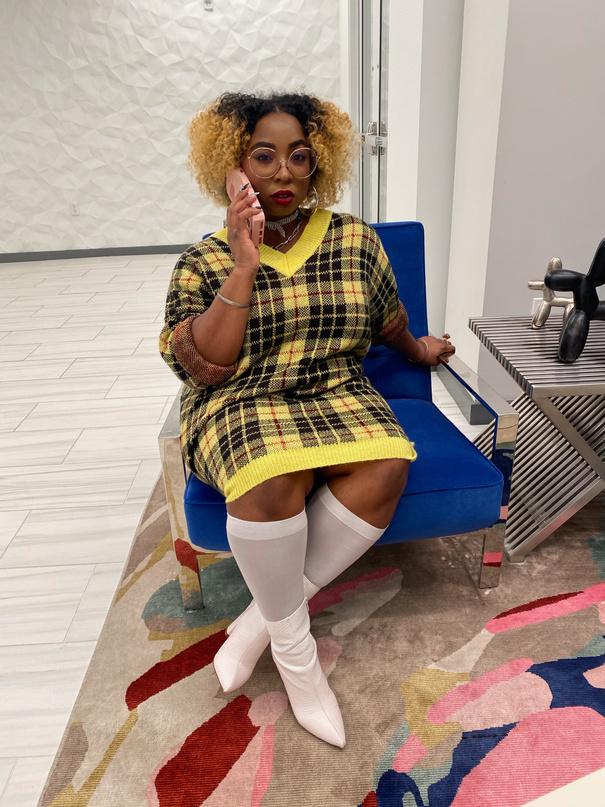



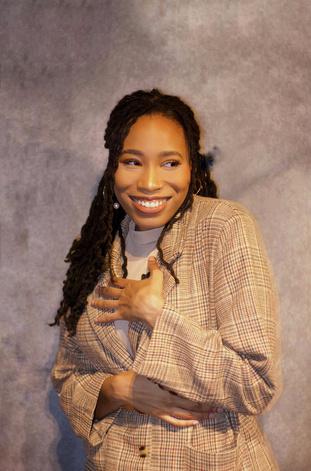

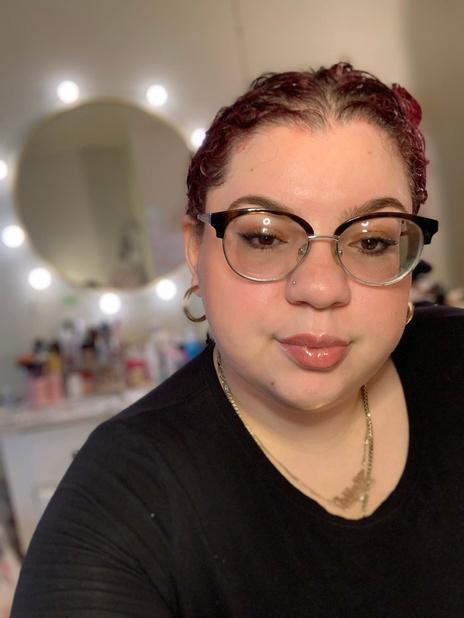
 MMasthead asthead
MMasthead asthead
Table of Contents Table of Contents
6 6 Our Daughters, Ourselves Our Daughters, Ourselves Amanda Rosas Amanda Rosas 7 7 Surrender Surrender Michelan Le’Monier Michelan Le’Monier 113 3 The Last Goodbye The Last Goodbye Chandra Persaud Chandra Persaud 116 6 Love Language Love Language BSL BSL 119 9 Lay In Me Lay In Me Elise Guzman Elise Guzman 21 21 Strawberry Moon Strawberry Moon Amanda Rosas Amanda Rosas 23 23 In the Mourning In the Mourning Shandrea Murphy Shandrea Murphy 26 26 The Eleventh Hour (with Sincere The Eleventh Hour (with Sincere Apologies to Psalms 23 Apologies to Psalms 23 Jeeks Rajagapol Jeeks Rajagapol 27 27 In Dreaming In Dreaming Ayumi Inoue Ayumi Inoue 31 31 Bilingual, 1950 (To my Dad) Bilingual, 1950 (To my Dad) Amanda Rosas Amanda Rosas 37 37 Salve and Thread Salve and Thread Amanda Rosas Amanda Rosas 9 9 Brown Woman Still Standing Brown Woman Still Standing Ghazah Abbasi Ghazah Abbasi 32 32 JJawbreaker awbreaker Noelle Maria Nagales Noelle Maria Nagales 38 38 LLonging onging Jaela Vaughn Jaela Vaughn 114 4 The Sky is Bluer The Sky is Bluer Elsa Bermudez Elsa Bermudez 115 5 The Sky is Bluer Ep. 2 The Sky is Bluer Ep. 2 Elsa Bermudez Elsa Bermudez 28 28 Gum Gum Elsa Bermudez Elsa Bermudez 117 7 After Hours Self Care After Hours Self Care Brown Sugar Brown Sugar 24 24 The Eleventh Hour Playlist The Eleventh Hour Playlist Brown Sugar Brown Sugar 36 36 A Chewy Chocolate Ginger Molasses A Chewy Chocolate Ginger Molasses Cookies Recipe! Cookies Recipe! Brown Sugar Brown Sugar 40 40 Book Recommendations Book Recommendations Brown Sugar Brown Sugar PPoetry oetry PProse rose AART RT & More

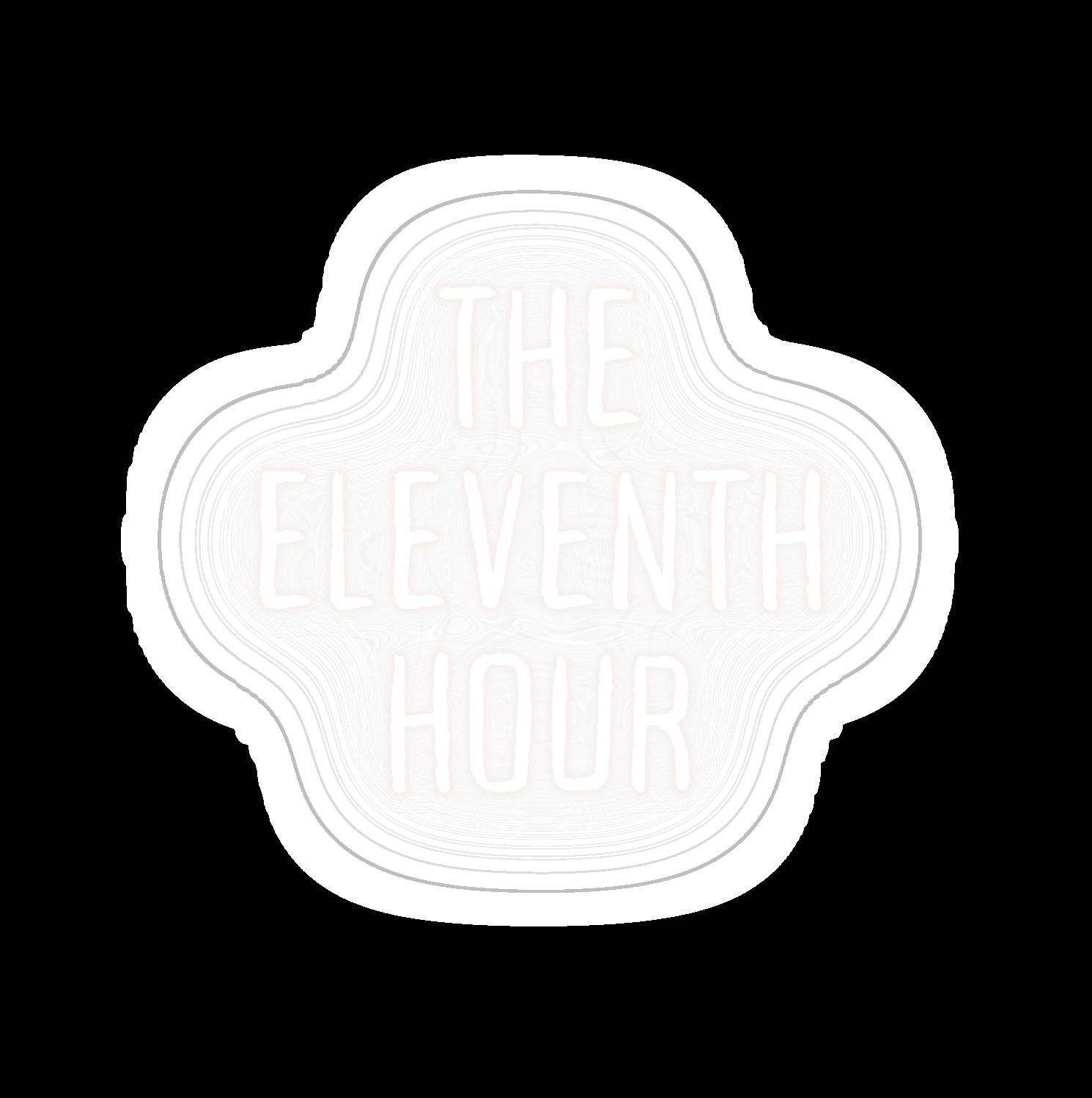
Our Daughters, Ourselves
Amanda Rosas
We spend so many days hating what we should love. The pronouncement of our aging and sagging, the soft dark circles under our eyes that are the heart of living and grief. The shadow cheekbones, the rudded lips all are wisdom run amuck, outstanding and redemptive, the oath reminders of our own unvanquished beauty. We raise daughters that see blemish instead of art, talent, speed and the real weight of knowing the body is mind, is soul. Our daughters, ourselves are something bigger than future, and I don’t know what that is, except that it’s made of the skin of intention and of the clay of heart flattened and reshaped by our own muddied hands along the way. Whatever it is, we must work for it now while the fight in our voice has hope like a vision. While our daughters stand like survival in a field of phoenix and smoke.
6
Surrender
Michelan Le'Monier

*Trigger Warning: Strong themes of suicide.
The waters beckon a swift end.
My mind is hazy, Feeling only the rails digging into my palms skin
As I hold myself steady
Anger sizzles into despair, I must choose. Death or nightmare.
Ripples reflect my urge to move forward
From the memory that replays in my head. Honeymoons are meant to symbolize beginnings Yet somehow has led me to this ledge.
My heart, though snuffed like a candle
Beats faster at the thought of this decision.
My legs wobble as they make their way
On top of the bars, time’s ticking.
7
My foot reaches the other side
Bracing for a leap as strong as his lies
Time’s ticking.
The call is enticing, Like the glint of the ring That held his finger, once vowing. Now resting
In my hand, disowned.
It’s as if the ocean knows.
But as the 11th hour strikes 12, An arm loops around my waist And pulls me into themself
Time is put back on the clock
As my body rests against wood
Breathing heavy from the shock.
Will this arm lead to freedom Or keep me in prison?
8
Brown Woman Still Standing
by Ghazah Abbasi
“There’s a dead-end to my left, there’s a burning bush to my right/ … Or am I standing still/ with the scenery flying by?”
- Jewel, Standing Still, 2001.
I remember watching the video to the Jewel song “Standing Still” in my family's living room in Karachi, Pakistan. The TV must have been set to Channel V or MTV India, both part of the Star Asia television network launched in the mid-1990s, bringing the West to the East, but maybe not vice versa. The video depicts Jewel cooing in a car coasting along the open expanse of an American highway, leaving behind a trail of white males a small boy playing with a toy-truck; a non-creepy avuncular older man who provides directions; a working-class construction worker who merits only a corner-eye glimpse; and finally, a class-appropriate man with a broken-down car who she piques her interest and whose gaze she returns.
I was watching the music video on low volume in a darkened den in the center of a small apartment. In an adjacent room, a parent recuperated from a workday of poorly compensated gendered labor of teaching elite children. In another adjacent room, a sibling struggled to translate parental desire for upward mobility into meaningful academic gains. In another country, a second recuperated alone, bankrolling (as we were frequently reminded) the family's collective effort towards at least maintaining, if not transcending, middle-class status.
How did the spectacle of a (recently blonde-ified) representation of a white Western woman wearing a white tank top and denim-booty shorts impact my teenage self? Perhaps underneath one parent's experience of (non-white) (non-Western) working-class poverty, and another parent's experience of subaltern non-personhood in relation to that working-class, perhaps underneath those divergent experiences of non/personhood in Pakistan lay a common desire for bourgeois
9
Western white femininity. Perhaps it was this dual desire that channeled through me sitting in the den of our compact flat, and it is that desire that I now recall as a resonance around the theme of feminist emancipation. Although the spectacle was ‘ new ’ and made possible by global communication technologies of the moment, the desire that it elicited in me bore the legacy of a much longer history of the oppressive non/integration of Pakistani proletarian and subaltern classes into global political and cultural economy. Transnational media flows facilitated by global capitalism may have instilled in me the notion of the necessary intersection and synonymity between feminism and Westernized upward mobility. My transition from girlhood to womanhood, however, showed me the deep conviviality between Westernization, upward mobility, and ‘local’ patriarchy.
"Keep your feet inside the chaadar. ” - Urdu idiom, relayed by my mother as an admonition against overspending, 2007.
I attended a private liberal arts college in Lahore, majoring in the Social Sciences, spending four years thinking, learning and thinking hard about class and ethnic violence and state
authoritarianism in Pakistan. So, it came as a bit of a surprise to my colleagues when I took my first job at a European commercial bank in Karachi.
But why? All the years of living my life, educating myself, and socializing with like-minded peers hadn’t filled me with enough of ‘ me, ’ hadn’t instilled enough of a sense of me-ness or selfhood to know what I wanted, and stand up for myself. It also felt like I was lost in a nihilistic haze in which the pros and cons of the most important choices of my life canceled each other out. On one side were my leftist ideals and germinal aspirations for an academic career, on the other side was my sense of personal disempowerment, sense of filial obligation, the non-governmental organization industrial complex, and the social alienation and political apathy of urban life in Karachi. I felt numb and empty. Without a strong conviction in the desire for my personal happiness or professional fulfillment, each choice seemed equally pointless.
My inability to live my life for myself left a void that my parents were eager to step into. In their view, my labor was not mine but belonged to them. I got the job offer in Lahore while I was still a senior. It was prestigious, highly coveted,
10
and high-paying for a fresh graduate. My job paid enough to cover most of our expenses as a middle-class family in Karachi. At the time, my father was unemployed, my mother didn’t make that much as a schoolteacher, and my brother was doing his own thing in Australia. I was unsure of what to do and called my mother. I asked, “Should I take it?” She responded, “What do you mean? Of course, you ’ re going to take it.” So of course, I took it.
After graduating, I moved back in with my parents, as was customary. It was at some point during that year at the bank, I remember my mother telling me to keep my feet inside the chaadar. The word ‘chaadar’ refers to a few different objects in Urdu. One chaadar is the sheet used for covering during sleep, and it is this kind referred to in the proverb. However, chaadar also refers to a loose cloth many women drape over their heads when they step outside of their homes in Pakistan. Why did my urbanite, convent-educated, 'English-medium,' middle-class mother use this patriarchal, linguistically particular metaphor to instruct me to not spend too much of my own money? Was there something at stake in it for the capital accumulation of ‘the family?’ If so, what forms of power were deployed in that
sentence to lay claim to my paid wage labor?
The family situation was not great. Being gainfully employed was a doubleedged sword. On one hand, I felt that I was not contributing enough financially, though I was the primary breadwinner. On the other hand, I was being disrespectful by contributing at all, being the youngest member of the family, a woman. My employment and my father’s lack thereof stimulated a deep and very toxic crisis of his masculinity, which I had to bear the brunt of.
During my time at the bank, I managed to get deeply depressed after having disavowed everything I cared about and stood for, completely disconnected from my purpose. I contemplated suicide that year. My mother’s reaction was not as alarmed as I needed it to be. I remember it as somewhat muted and confused, about how I shouldn’t because I was young and hadn’t seen the world.
Just in time, though, I found my way into psychotherapy. Within a few months, I quit the bank job, and began work for a social science research collective for half the pay. I stopped contributing as much financially, paying only my share of household expenses. Somehow, making
11
less money made me feel more ownership of the money I did have. Making less money made me feel, and actually be, safe. My father got a job that restored his masculinity (he made four times as much as me) and his rage became less violent, transforming into a low-level perpetual contempt. Together, we had restored the patriarchal social order.
Retrospectively, I see that I was socialized into poverty. When I was a kid, every time I touched cash, my mother told me to smell the stink in my hands and wash them. I never saw or received any cash or kind gifts from friends of relatives. My parents took the cash for themselves and passed the gifts on to other kids. The family crisis stimulated by my employability was the grown-up, higherstakes version of that. When my brother went to medical college, my family purchased a flat in a building half an hour away and we moved countries to make life easy for him. When I went away to college in a different city, my monthly allowance was the same as it had been for him, though he had lived at home while at college. Our mother gave him extra cash to splurge with friends, saying explicitly that it was because he was a guy. When I went to college, she once screamed at me on the phone for spending too much money on laundry detergent. Many years
later, in graduate school, I struggled financially, like many others do. More than once, I was on the verge of eviction and food insecure. Money seemed like an alien, amorphous substance that came and went without much intention or planning on my part. Sometimes the money was in the bank and other times it wasn’t. Either way, I didn’t feel like (my) money was my ‘possession,’ something that could belong to me.
Today, as a grown woman, despite the many advances I have made, I still struggle with finding long-term employment as an academic. Part of the explanation for that is surely structural, based on the hypercompetitive nature of the academic job market and the neoliberalization of higher education in the US. But part of the explanation is also individual, based in the personal internalization of patriarchy. It’s hard for me to let myself have it. It’s hard to interrupt the energy that runs through my neural pathways into the external world and back again, swinging like a pendulum, lulling me into scarcity. It’s difficult to persuade my subconscious mind that it’s ok for me to accept that which I desire. It’s difficult to rewrite bodily truths, to reconvince a body from which having was beaten out and into which not-having was beaten in.
12
The Last Goodbye
Chandra Persaud

At the end of every year, my love leaves me for another woman, for space, for time alone or sometimes, wordlessly.
His departure is short. Within three months, we reconnect.
Sometimes, I am skeptical. Most times, I feel electric. Each time, I find my way into his arms again.
Several months go by and I begin to relax, thinking of our last breakup not as a pattern but a one-time event that happened long ago.
But soon, I see that look in his brown eyes. Cold, distant, communicating some mixture of uncertainty and regret.
This happened again just a week ago. I already deleted our pictures from my phone and took his toothbrush off my sink.
I’m reminded of the Japanese art of repairing what’s broken with gold. I wonder if there’s a point where the breakage cannot turn into art anymore.
Tonight my knees press to the ground the first in eight years. My hands lick my wet face. When my esophagus loosens, my tongue lifts and begs please let this be the last goodbye.
13

14

15
Love Language
Say you love me in the language that feels like home to you. Home is the detachment we formed in our youth, unhugged but not unloved. The ones we loved most did not practice physical affection, they stood in the shadows, almost unhinged, with smiles not too wide but inched enough to see. It’s the reasoning for my hesitation, the why I can’t let love roll off the edge of my tongue as I play with the coils of your hair. I do love you, understand. Understand that the tongue in which love leaves me does not fall easily into the palms of lovers.
BSL
16
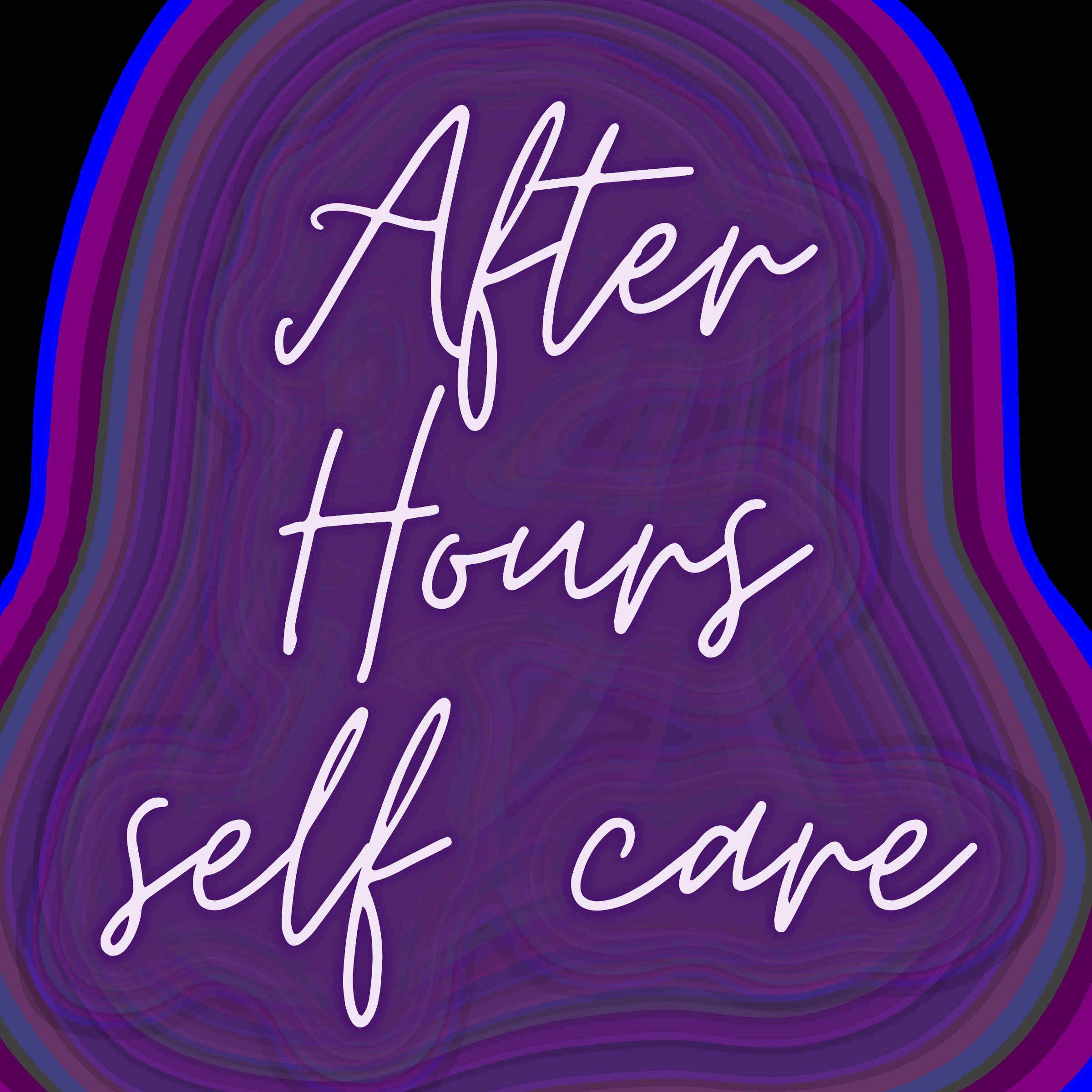
With the intensity of our day-to-day, it’s easy to forget to show yourself some unapologetic love.
Well, with the New Year approaching, it’s time to prioritize self-care, self-love, and self-desire.
Here are three little things to give yourself some after-hours self-care:
One:
Dance like no one is watching. Dedicate 10 to 30 minutes after returning home to dancing. Choose music that fuels you.
Two:
Meditate. Our minds are constantly on go. Allow yourself to give yourself pause. Allow your mind to go silent. Even just five minutes of meditation can change the course of your night or day.
Three:
Journal! While practicing your art is an essential part of being an artist and creator, journaling is a practice that is both beneficial to the growth of your art but also your mental wellbeing. Similarly to meditating, journaling is a way to ease the worries of your mind and even create concrete solutions for the troubles currently weighing on you. Best of all, the rules for journaling are entirely up to you.



18
Lay in Me
Elise Guzman

I find beauty when our skin lays like butter, you, asleep and soft, unaware of this quiet space me, eyes wide and observing all the curves in your face
When you turn over, I rest my forehead on your spine, give it a kiss at the center, gentle love, like when peony petals touch, I want to provide you with that,
Even in the waves of contradictions, you stay afloat like me, smile sometimes, frown others, turn our backs on bubbling turmoil.
Yet, I need to dip my hands in the saltwater, then my body will metaphorize with the bubbles, with all of the untapped love my lips couldn’t spill like seafoam.
I wish I could still.
19
Tell me everything, every detail from your grocery list, to the reason your best friend made you laugh today, to ways you find comfort in the dark, to the ideas you created for step routines Everything matters.
Why my heart goes shy, I would have kissed every inch of you already Every curve, every mark, every scar, every coil.
I’m sorry I couldn’t wrap my soul into yours. It’s too late now, but you’ll always hold space inside of me, in the bud of each petal, in the smiles we gave each other through this year, Tomorrow and for all of the rest.
20
In the Mourning
Shandrea Murphy
To say that it pains me to leave you doesn’t do enough to encompass the feeling of death that comes over me as I watch you walk through the door, and take the me the I adore right along with you.
I know now that it’s not just your touch that I miss, but it’s the way my fingers flow across your skin while my mind empties itself of everything but you and what you bring out of me.
The light that shines in my eyes whenever you ’ re around comes from my vision of us. It’s me longing for the chance to see if my love for you could be as strong as the grief that keeps me tethered to sheets when I can’t have you next to me.
I have never felt more weightless than I do in your orbit. Your essence carries me as effortlessly as the ocean carries grains of sand
21
Your gaze penetrates me in a way that only you can, perceiving me in ways I refuse to see myself, seeing spaces in my mind I had never occupied, stripping me naked but leaving me unafraid.
You feel like home, the place where I am warm and safe and protected, where fear can’t find me anymore, like a shelter for my innermost desires, my curiosities, room for me to kick and scream.
But beneath it all it’s just a dream, my delusion de jour Deep down I know you ’ re not even all that I make you seem, and the me that I see would in truth be broken by the you that I turn a blind eye to.
And still, I sit in my grief hoping that one day, we can resurrect what could have been and who I would be.
22
Strawberry Moon
Amanda Rosas

I don’t know if I can continue to rise above as you do. In June you are rosy, blush the night, as if stronger. Like a story resurrected, rewritten with each death day brings you. For that short time June drains your yellowed marrow, the earth enters your heart and the sky is a mind, a body, a spirit, and the stars burst, stains of your emotions. You give praise to summer for joining your circle of cross-legged thoughts, giving yeast to the mingling grass, filling the holes where there was huddling but no warmth. I don’t know if I will rise above as you do, even after July drains your lush blood to nurture bonds with a plum ripe sun. Each day a death, each night a ghost. Teach me to revive always from within, rinsed, wrung, on faithful repeat.
23



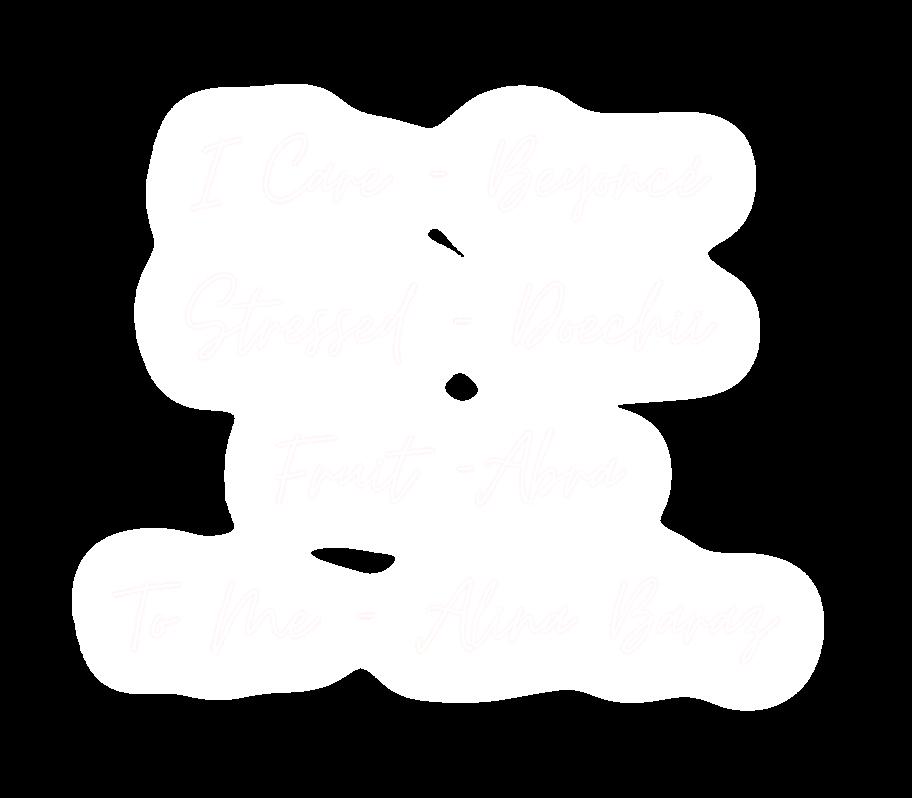
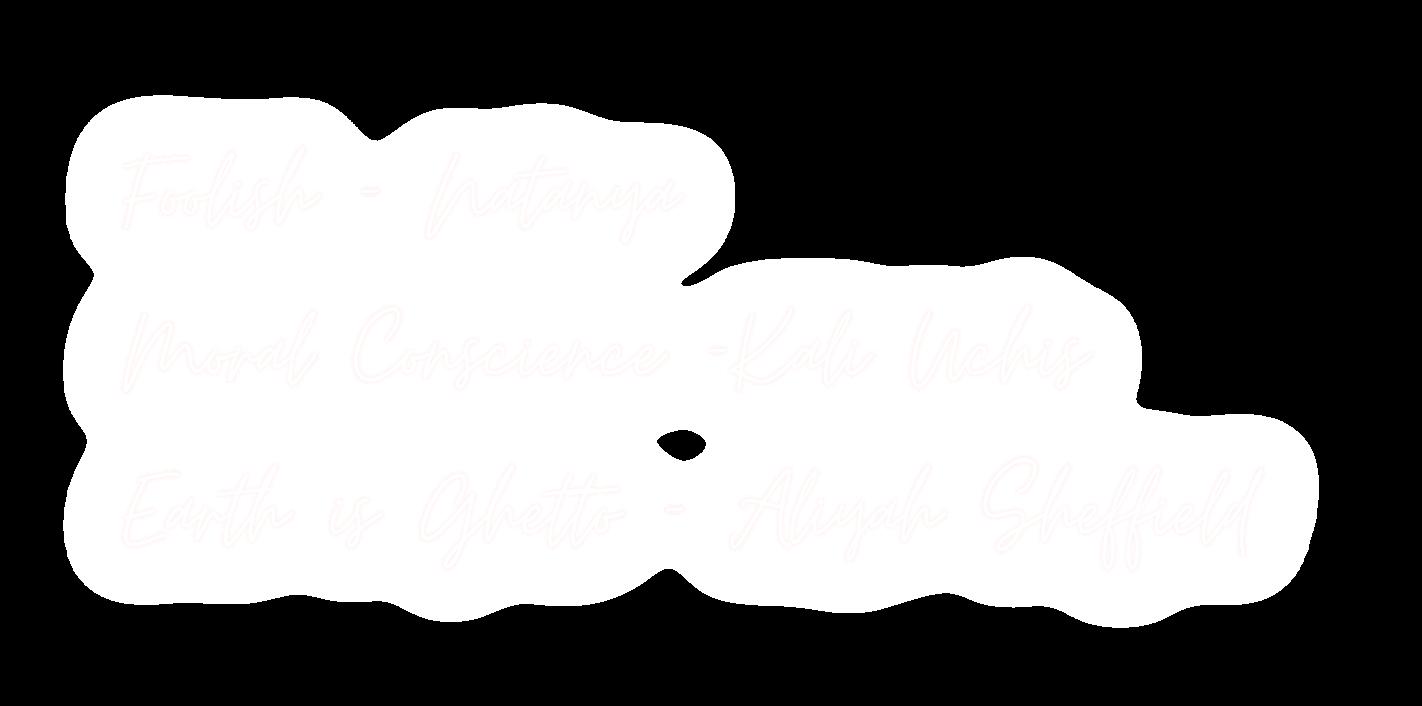
24
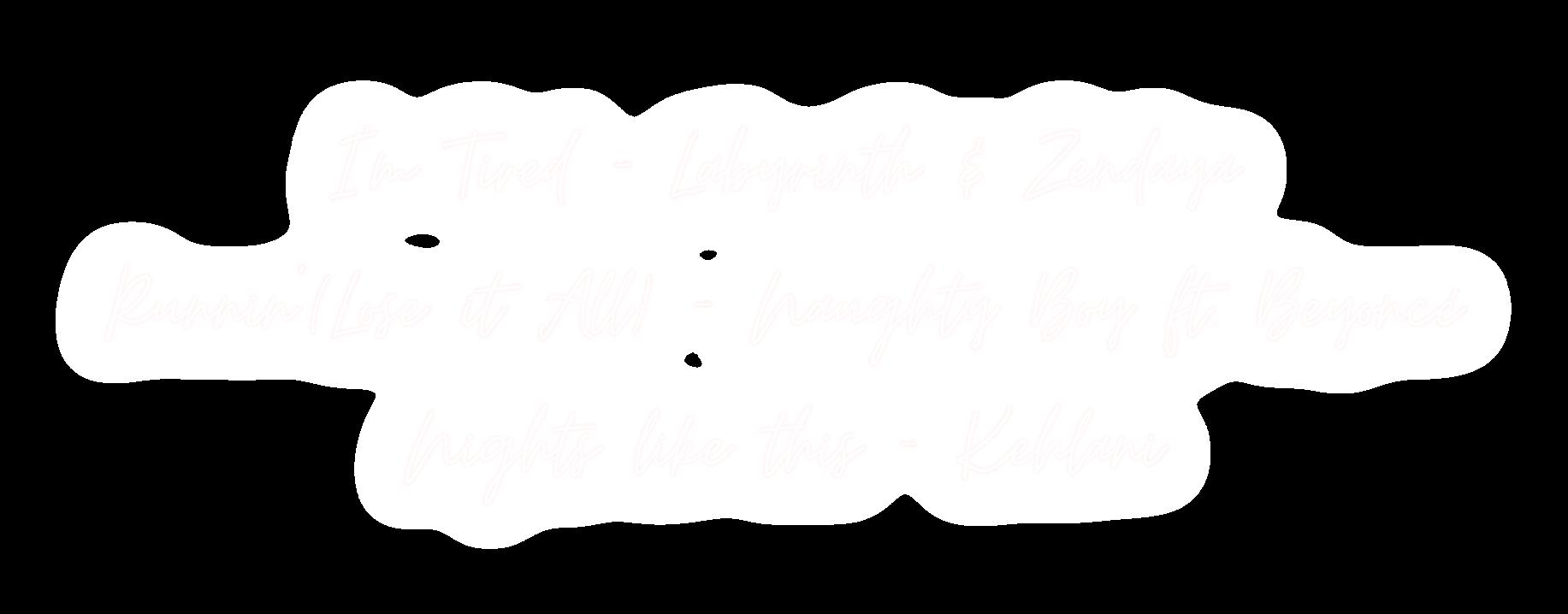


25
The Eleventh Hour (with sincere apologies to Psalm 23)
Jeeks Rajagapol
The eleventh hour is my savior; I shall not hasten.
It maketh me procrastinate: leadeth me to useless websites.
It giveth me false confidence in my efficiency: maketh me overestimate my time as postponed tasks take on a new allure.
Yea, though I fear I might not meet the deadline, I will continue to squander my time: for the eleventh hour will rescue me; its fifty-nine minutes will make me feel invincible.
The Internet prepareth for me a plethora of temptations; cat videos whisper that I will only need a half hour, the black hole of a streaming binge sings a siren song.
Surely I shall live for the goodness and mercy that the eleventh hour bestows upon me: spinning a myth of preparedness when in reality, I will only do a fraction as good a job as I could have: and I will dwell in mediocrity, self-chastisement, and false confidence about my abilities for all the days of my life.
24 22
In Dreaming
Ayumi Inoue
Do you know of life amidst the clouds?
An endless span of comfort and white, familiar to people down to its individual shapes. Somewhere the clock rings, tick tock. Tick tock, tick tock, tick here comes another day, and here my shoulders tremble
Below, they say, is a land unimaginable and uncertain, where days neither repeat, nor things remain familiar. Treasures come in strangest forms: memories, misfortune, aspirations, risks, laughter dreams.
In the coddling embrace of familiarity are whispers of duty to seek fortunes for the luxury of many; to solidify my name with wisdom and honor; to sacrifice that which feeds the spirit—sin to duty and my capabilities; to achieve someone else’s dream.
Wisps of smoke appear from nothingness, clutching my throat, then my hands, then my mind,
engraving the words on my very soul: responsibility, stability, for the majority responsibility, stability, for the majority responsibility, stability, for the majority. Yet down below remains mesmerizing, its promises of risk and living and dreaming, beckoning.
Stability be damned, I plunge into my damnation, embracing the curse of eternal dreaming, banished from a future of luxuries and salvation I trod the path of my own forging. I dream.
27
“Gum”
by Elsa Bermudez
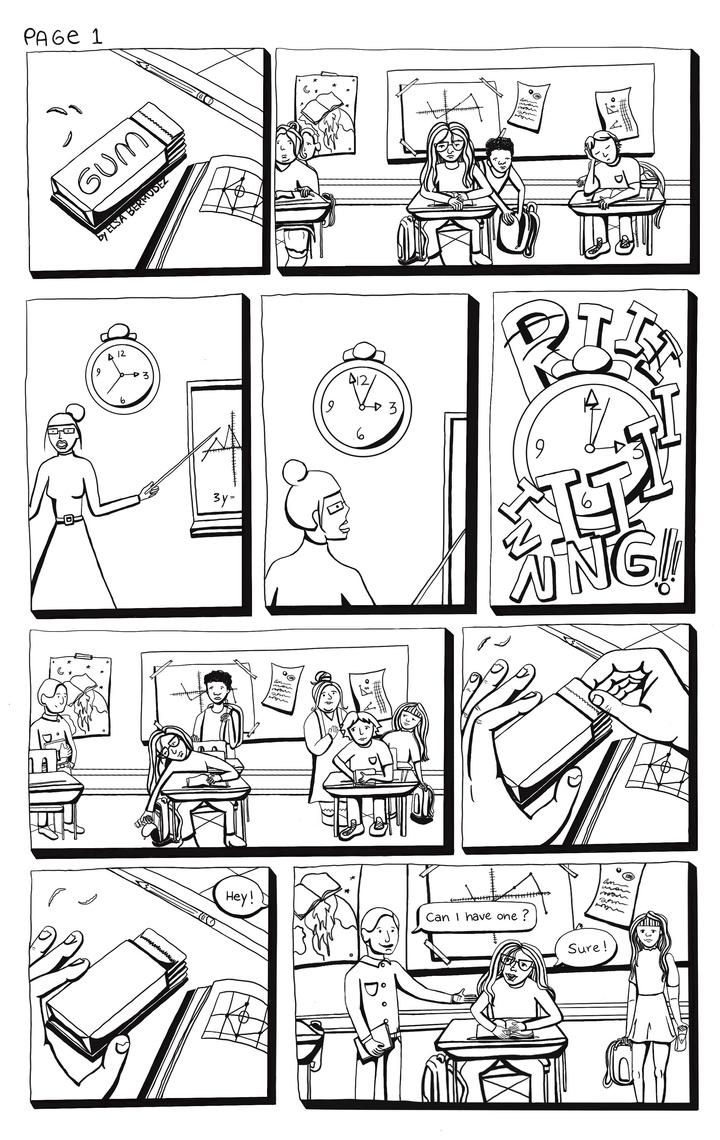
28

29
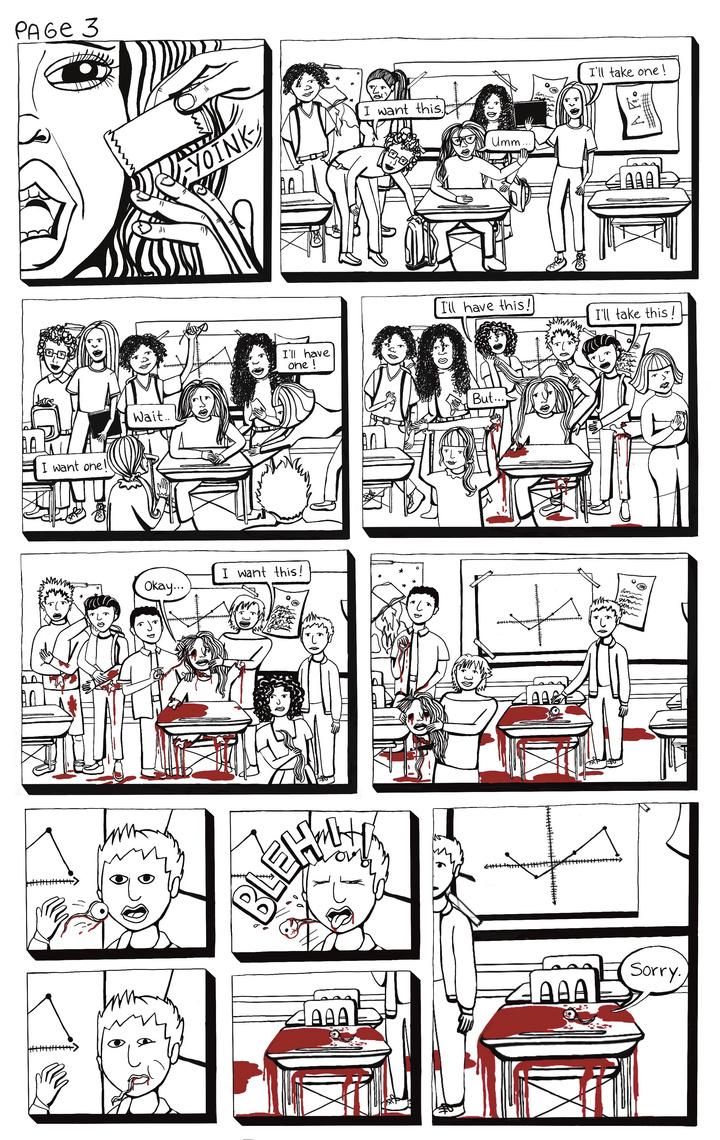
30
Bilingual, 1950 (to my dad)
Amanda Rosas

You speak Spanish so your English must be too broken for first grade. Never mind that you have known these languages as seeds before they could germinate and inhabit the orchard of your mouth. That you know with archer’s precision, which arrow of word will win the gravity and splice the center of what you mean to say in English or Spanish.
You are native speaker twice over.
Your metallic blue lunch tin reveals tacos de chorizo con huevo, the hungry swell of manteca tortillas. When you are six, humiliation begins to smell like this, but you decide not to name it. It’s a feeling that starts in the recesses of the gut. It’s the bullet train that provokes heat, the copper tones, never red, blossoming in the oscuro chestnut of your cheeks. You are ready to drift away as unannounced as your arrival when your mother halts you with a brick hand. She is stubborn and tenaz, and will raise bilingual hell until she gets her way. You start first grade, alert, electric, though always feeling in between the currents, your worlds constantly divided.
31
Jawbreaker
byNoelleMariaNagales
“Tell me something funny ”
I had an obsession with candy stores. Not just any kind. The kind where the floors always stayed sticky, no matter how many times you mopped; where shelves of forgotten condoms and expired prescriptions caved into one another, and the storekeeper, glued to their telephone, never asked what you want.
My father would take us there often, on those cool summer nights. My brother and I would race in on our Razor scooters, dressed in our pajamas, and sneakers half-worn without any socks. My father would cash in his lottery tickets, dud after dud, while my brother skidded towards the back. But it wasn’t the ice cream I was interested in. I had my eyes set on bigger things, better.
Candy machine, jaw-breaker, ball breaker . . .
Twenty-cents too short.
My father would give each of us some change, but it was never enough.
With eyes fixated on the silver candy machine before me, I would slip my fingers beneath the metal flaps, twiddling the tip of it, until an accidental scratch. Churning between the creviced spaces, I’d crank the crane; navigating the angle that works best it’s all in the wrists. Then turning the knob, once more–twice more, click.
I liked the way it sounded or more so, how it felt.
A single jawbreaker would roll onto the palm of my hands, staining the tan of my skin, red. And with fingertips still drenched in sweat, I would place the jawbreaker against my lips. Savoring the taste of sweet alongside a pinch of salt.
And I did it every time we went; for years and years, until the candy store eventually closed down and those cool summer nights suddenly felt warm.
“They had the sweetest jawbreakers,” I would tell her.
32
But she’d argue otherwise, saying “it was doing the things you shouldn’t have that made it all the more sweeter.”
There was something about her that I simply adored; the way she held a silver coin pressed against her lips, as if masking the crevices of her smile and the red of her ruby lips. She had a thing for dirty things, dirty old men. George Washington would always face her, as she held the feathers of an eagle, clipped in between her index finger and thumb.
I knew she never liked me.
Maybe it was because I wasn’t dirty enough or maybe it was because she was, that I liked her more than I should have.
And I thought about it often: at what point do people fall in love, fumble, stumble, fall out of love? I thought about it often, lying beside her as her long black hair slung over her shoulders and her back, turned towards me. I’d look up to the four corners of her bedroom walls, staring at the silhouettes of our bodies and the shadows of cars that raced in and out of focus; slipping in between the cracks of her bed-sheet curtains that draped the things always forgotten.
She had a particular way of doing things the way she continued to fill her bookshelf with things she’d never read or the lingerie she hung from the outside of her
closet after each laundry day, yet refused to take down, even weeks after drying. Every fragrance of Chanel N°5 sat on top of her dresser, but it was only one that she would use over and over.
The scent of Eau Premiere overfilled every corner of her room; her collection of fake plants, rugged carpet and the space in between the two of us.
At what point do people fall in love . . . I thought about it often was it the moment she’d find herself on top of me; the strands of her hair that found themselves intertwined with my own or the red of her lipstick that stained my lips as she retracted herself from my kiss.
. . . fumble, stumble, fall out of love. She had a particular way of doing things, each time we’d make love. She would cash in her quarters; before undressing herself, she’d remove the loose change from her pockets. And I’d watch as she would drop each twentyfive cent eagle into a mason jar, sitting above her nightstand.
It was the sound of clinking coins that she swore was her favorite. But there was something about it that I hated more than anything.
And I’d watch, each time we made love, each time she fell asleep the jar of coins that sat above her nightstand mocking me: how many of them belonged to me others? I wondered . . . what she would’ve said, if I asked to count them. If she’d let me.
33
I’d imagine, slipping myself from beneath her grasp and with one arm extending, reaching out towards it. My fingertips would brush against it but only for a moment, would I find myself second guessing, wondering if I should pull it in closer to me or push it over the edge the jar of coins would shatter, spilling itself onto her carpet. And I’d think of cashing out every quarter that belonged to me.
Twenty-five cents for every time told me to spend the night.
Fifty, every night she told me not to.
“What is it?” she groaned. She was particularly cranky when she woke up in the middle of night, almost nasty. The way her brows furrowed and gaze pierced through me, no matter the answer. It made me angry.
The way she would turn herself over to lay flat on her stomach. It was her way of saying, “ you ’ re annoying me now ” She buried her face deep into the pillowcase. And I’d watch as her long black hair continued to spread over her bare back flashing the tan of her skin, exposed in between the tousled bed sheets. But it was only once that she’d decide to look up, only when she knew for sure that she had an audience.
“What?” she snapped, her tone even colder. It looked as if she would hoist herself up from off the bed at any moment. But she never did. And I never answered.
Nothing was all I ever said.
She remained still, unbothered in those moments. Just like the time I first met her; her face was buried into a pillow as she slept soundly all by herself, on my side of the bed. She had been sleeping with a guy I had been seeing at the time And although she wasn’t the first to be caught, she was the first either brave or bold enough to stay.
“Come join me, ” she laughed. She scootched herself over, pulling the blanket in closer to her but left just enough space for myself.
She had a particular way of doing things the way she asked for things, said them; almost taunting.
“Say something ”
“Nevermind, forget it.”
“I’m bored.”
Her words crept under my skin. The way she had all the answers, even for questions she never meant to ask.
And like any other person, I thought of thrashing that bedroom; turning the furniture over, taking everything that belonged to me and anything that didn’t, imagining my hands wrung around her neck.
But there I stood, underneath the doorway in silence, staring at the red of her parted lips and her dirt colored eyes.
“If you ’ ve got something to say, you might as well spit it out.” Her expression grew stern, suddenly irritated. “Well?”
“Nothing.”
34
My eyes traced every inch of her everything I could see, and anything she’d let me.
“Nothing?”
Candy machine, jaw-breaker, ball breaker . . .
Twenty-cents too short
Click. She burst into laughter. And suddenly I found myself on top of her, our legs intertwined with one another’s. She ran her fingers through my hair, pulling me in closer to her and my lips pressed against her’s, silencing the laughter . . .
And I did it every time we met; for years and years, even after the jar of coins suddenly overfilled itself and those cool summer nights never felt warm.
35
Chewy Chocolate Ginger Molasses Cookies
Ingredients
3/4 cup of butter, melted
1/3 cup of brown sugar
1/3 cup of granulated sugar
1/3 cup of molasses
1 1/2 tbsp of grated fresh ginger
1 large egg
1 tsp of vanilla
1 1/2 cup of flour
1/2 cup of cocoa powder
1 tsp of baking soda
1 tsp of cinnamon
1 tsp of ground ginger
1/2 tsp of salt
1 cup of chocolate chips

Method
1
Whisk melted butter, sugars and molasses in a large bowl. Whisk in fresh ginger, egg and vanilla. Sift the dry ingredients into the bowl and stir until combined (dough will be soft). Stir in chocolate chips. Chill dough for at least 2 hours or overnight.
Preheat oven to 350 F. Grease 2 baking trays or line with parchment paper.
3
2. Portion 1 tbsp of dough and shape into a ball. Roll each cookies in granulated sugar to coat and place on the baking trays, 2 inches apart. Bake for 10 to 12 minutes, until they crinkle and feel set around the edges when gently pressed. Cool cookies on the trays for 10 minutes before removing. Makes about 30 cookies.
36
Recipe courtesy of Anna Olson (annaolsonca)
Salve and Thread
Amanda Rosas
you don’t know how to name it, so we call it childhood and memory, a walk-thru of black and white, a bit of gold preserved. your sister’s womb, a vivid part of you. all those years ago. your sister was by your side each night–infants to adolescents, and when it wasn’t a shared bed, it was a room. so when the baby died inside, your bodies wept in unison, never draining, and still you never speak of her stillborn grave. you don’t go to school, you care for your sister and your mother who lies in bed, a flowered handkerchief wilting in a fist that covers her grief of a mouth and you won’t dare give it a name, so I name it for you. to tell your story is to survive. stories made of dead children and stabbed in the gut dreams that i can mend with the salve and thread of ravenous words, a naming of the nameless, covering you.
37
long·ing
/ˈlôNGiNG/
long•ing
by Jaela Vaughn
noun noun: longing; plural noun: longings a yearning desire. 1. adjective adjective: longing having or showing a yearning desire. 1.
Miri’s desire for him made her ache. She lost sleep, food hardly had a home in her stomach. Miri simply became sick with how much her longing had eaten away at her.”
A longing for the kiss she’d never gotten. An urge to ask him for the hug she’d only felt in her dreams. What once was lust had become a beast of a different burden. He’d become the basis for all her emotions. If he seemed unhappy, she’d be depressed. If he hungered for food, she’d be near the point of starvation. Starved in mind for him. Starved in body for the ambrosia that would be him. She’d swallow him whole just to see if it would settle the painful pangs that wracked her body at the sight of him Yearning for a smile that was never hers.
“Good morning!”
“Good morning,” he replies.
He sounded tired. Unhappy. Was it because of her?
“How are you?” Are you okay?
“Fine, thank you. ”
Pleasantries. Unpleasant pleasantries that she hoped so badly that he would see through. She wanted to know if anyone had broken his heart recently; if he saw a sunset so beautiful, he cried. She wanted to know if he slept well, if he ate all his meals, if he’d felt some sort of love.
Yearning for an answer she’d never get from a question she never asked. She saw the dark rings under his eyes, he was lying. Lying’s a word that felt just as long to say as longing. She’d never lie to him. Not even if he asked.
38
Perhaps there was a deity in the sky that had seen the way Miri beheld all her pining within her big brown eyes. Captivated by the way she wore her desire. The way her cheeks appeared gaunt from hunger the way her skin went taut simply parched from the lack of attention she received from him. Maybe it was a lonely god, shunned from their love and no longer could they stand to see her suffer through the same fate.
The man Miri decided to latch her heart onto took the same bus as her. They didn’t work the same job, they didn’t live in the same building, all she had with him was their time on the bus. Their time with too many seats apart, both propped against a window, letting the bus concuss them as it raced through the early morning streets of the city.
She wanted to be on time to the stop so that she could begin her morning ritual of staring at the back of his perfect black head of hair and thinking about how wonderful it would feel to run her fingers through his wavy locks She usually woke up an hour early just so that she would have the time to see him.
However, Miri had been running late today. She found herself in the unfortunate predicament of having only one shoe on (grasped in the hand she waved at the bus), a coffee stain on her white blouse, and a run in her tights that made her look more like a cheetah than a woman having a very rough day attempting to catch the bus. She could tell she was failing, that the bus was about to pull off after the last person got on. Miri was ready to admit defeat to the public transit system when she saw a hand stop the doors from closing.
Miri could hardly believe her eyes. It was her man! Her reason for looking so disheveled when all she wanted to be perfect.
“You getting on?”
Miri wanted to go home and clean herself up, but he was holding the door for her and there was something so kind in the way he stared. His eyes were a wonderful shade of brown, Miri could not help but think. Was she getting on?
Miri smiled and nodded, responding with an enthusiastic “Yes!”
And with her shoe held firmly in her grasp, Miri got on the bus. She got a very giddy feeling in her chest, like the sight of his smile makes her think she can take on the world She must know her hero’s name.
“What’s your name?” she asked tentatively.
“It’s John. What’s yours?”
The smile she wore was enough to make him show his own. She thought he had a wonderful smile.
“It’s Miri.”
And then, as they say, the rest is history.
39
11th Hour BOOK RECOMMENDATIONS





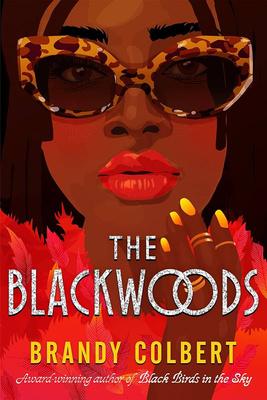

 The Last Minute First Lady Tinia Montford
Kindred by Octavia E. Butler
Sea Change Gina Chung
The Book of M Peng Shepherd
A Little Life Hanya Yanagihara
The Color Purple Alice Walker
The Boy Next Door Irene Sabatini
The Last Minute First Lady Tinia Montford
Kindred by Octavia E. Butler
Sea Change Gina Chung
The Book of M Peng Shepherd
A Little Life Hanya Yanagihara
The Color Purple Alice Walker
The Boy Next Door Irene Sabatini
40
The Blackwoods Brandy Colbert

Ghazah Abbasi (she/her/hers) is currently employed as a Postdoctoral Associate in Public Engagement at the Brooks School of Public Policy at Cornell University. She holds a Ph.D. in Sociology from the University of Massachusetts Amherst.
Elise Guzman is a writer, artist, and activist from Brooklyn, NY. She is currently studying for a BFA in Creative Writing at Emerson College. Her work is concentrated in poetry and prose, including the intersectionality of her identity as a queer, bi-racial Latina She believes there is so much this world has to offer when it comes to reading, listening, watching, and exploring, that are never fully done living.
Ayumi Inoue is a 21-year-old student and aspiring writer. Born and raised in the Philippines, she is currently pursuing Liberal Arts at a university in Japan. She spends most of her time thinking about stories, but she is now willing her thoughts to come into being by transferring them onto paper or an empty document.
Michelan "Mi·I·Mi" (pronounced Mimi) Le'Monier is a Black literary and performance artist, whose work centers the crystallization of moments in time and explores self-reflection through metacognition. An entrepreneur born and raised in Brooklyn, New York, now living in Atlanta, Georgia, she loves traveling, reading in the sun, and activities that foster growth through personal, professional, and artistic development. Mi·I·Mi is proud to be a young leader under the age of 30 who will continue to inspire and nurture black empowerment, creativity, wellness, and community-building
Shandrea Murphy-Washington is a writer, strategist, and culture worker based in Little Rock, Arkansas. She uses her gifts to create healing centered spaces where African American women, girls and gender expansive people connect their history and heritage to their healing journeys. She is currently researching Black Women’s Care Ethic across the state of Arkansas and leading her strategic consulting firm, Sankofa Community Strategists. You can find her on Instagram at @insouciant bibliophile

Noelle Marie Nagales is an Asian-American contemporary writer and author of The Way We Love. Her work focuses on existentialism, inspired by prose poetry and contemporary Japanese literature. She is currently an Assistant Adjunct Professor at The City College of New York and Baruch College, where she teaches composition and creative writing. You can find her online at noellenagales.com.
Chandra Persaud is a writer based in Brooklyn, NY. Her work explores topics such as love, trauma, identity, and the immigrant experience. She was born in Guyana, traces her roots to India, immigrated to the United States with her family as a child, and fully embraces her multicultural identity. Her work has been published in Defunkt Magazine, Brown Girl Magazine, and Journal of Expressive Writing. You can also find her on Instagram @pieces of acp.
A librarian for over a quarter century, Jeeks Raj loves books, trivia, learning, puzzles, and art She uses crochet as her justification for binge-watching shows, and loves to be caught off-guard by jokes. Born and raised in India, she has lived in every time zone in the continental US. You can also find her on Instagram @buttershug83.
Amanda Rosas is a mother, teacher and poet from San Antonio, TX. She draws strength and creativity from her Tex-Mex roots, and from her husband and three daughters. Her work has been published by The Latino Book Review, The Front Porch Review and Sweet Tree Review She dreams of becoming a full-time writer and storyteller You can also find her on Instagram @arosas0212
Jaela Vaughn is a Kindergarten teacher from the Bronx who writes in her spare time. Practicing her hobby and expanding her creativity helps her be a better teacher to her babies.













 MMasthead asthead
MMasthead asthead

































 The Last Minute First Lady Tinia Montford
Kindred by Octavia E. Butler
Sea Change Gina Chung
The Book of M Peng Shepherd
A Little Life Hanya Yanagihara
The Color Purple Alice Walker
The Boy Next Door Irene Sabatini
The Last Minute First Lady Tinia Montford
Kindred by Octavia E. Butler
Sea Change Gina Chung
The Book of M Peng Shepherd
A Little Life Hanya Yanagihara
The Color Purple Alice Walker
The Boy Next Door Irene Sabatini
